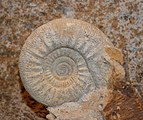
Caturus is an extinct genus of fishes in the family Caturidae in the order Amiiformes, related to modern bowfin. Fossils of this genus range from 200 to 109 mya. It has been suggested that the genus is non-monophyletic with respect to other caturid genera.

Aulacostephanus is an extinct ammonoid cephalopod genus from the Upper Jurassic Tithonian belonging to the perisphinctoidean family Aulacostephanidae.
Aegoceras (Beaniceras) is small, coarsely ribbed subgenus ammonite from the Lower Jurassic with coarsely ribbed rounded whorls. The shell is evolute, early whorls a barrel-shaped cadicone, later become serpenticonic.
Prorsisphinctes is an extinct genus from a well-known class of fossil cephalopods, the ammonites. It lived during the Middle Jurassic.
Procerites is an extinct genus from a well-known class of fossil cephalopods, the ammonites. It lived during the Jurassic Period.
Otoites is the type genus of the ammonite family Otoitidae that live during the Middle Jurassic.

Oppelia is a haploceratoid ammonite and type genus for the Oppeliidae that lived during the Middle Jurassic. Shells of Oppelia are involute with a small to moderate size umbilicus, bluntly rounded to sharp venter, and deeply impressed dorsum. Sides are generally smooth but may be variously ribbed on the outer flanks. Similar and related genera include Oxycerites and Oecotraustes.
Oecotraustes is an extinct cephalopod genus included in the ammonid family Oppeliidae and named by Waagen in 1869. The genus lived during the Middle Jurassic.
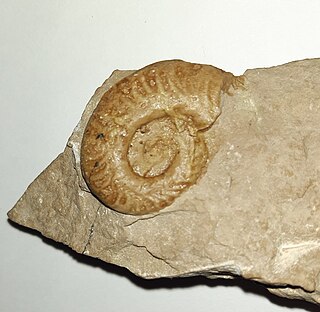
Hildoceras is a genus of ammonite from the Jurassic period in the family Hildoceratidae. The shells are characterized by a narrow discoidal evolute shape, keeled venter, concave ribs along the outer flanks, and a shallow spiral groove running along smooth inner flanks. Whorls slightly overlap, cross sections are compressed. The ventral keel is bordered on either side by a shallow groove. The genus was named by Alpheus Hyatt after Saint Hilda in 1876.

Orthocormus is an extinct genus of prehistoric pachycormiform bony fish. It is known from three species found in Late Jurassic (Kimmeridgian) aged plattenkalk deposits in Bavaria, Germany. The species "Hypsocormus" tenuirostris Woodward 1889 from the late Middle Jurassic (Callovian) Oxford Clay is not closely related to the type species of Hypsocormus, and is more closely related to Orthocormus + Protosphyraena, and thus has sometimes been referred to in open nomenclature as Orthocormus? tenuirostris.

Tragophylloceras is an extinct genus of cephalopod belonging to the Ammonite subclass.

Ludwigia is an extinct genus of ammonites in the family Graphoceratidae, which lived during the Middle Jurassic.
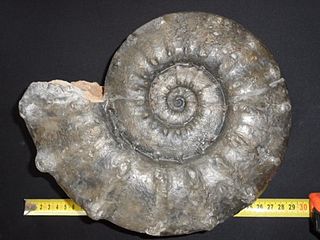
Euaspidoceras is an extinct ammonoid cephalopod genus that lived during the Middle Jurassic.

Pterotrigonia is an extinct genus of saltwater clams, marine bivalve molluscs in the family Megatrigoniidae. This genus is known in the fossil record from the Jurassic period Tithonian age to the Cretaceous period Maastrichtian age. Species in this genus were facultatively mobile infaunal suspension feeders. The type species of the genus is Pterotrigonia cristata.

Protetragonites is an extinct genus of ammonoid cephalopods belonging to the family Lytoceratidae. These fast-moving nektonic carnivores lived from the Jurassic period Tithonian age to the Cretaceous period Aptian age.

Reineckeia is an extinct genus of ammonoid cephalopods belonging to the family Reineckeiidae.
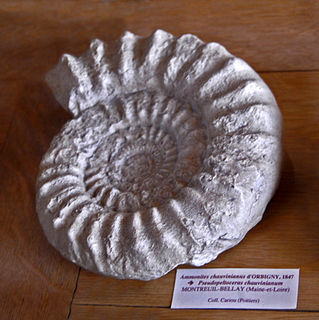
Pseudopeltoceras is a genus of perisphinctoid ammonites belonging to the family Perisphinctidae.

Parkinsonia is a genus of ammonites belonging to the family Parkinsoniidae.
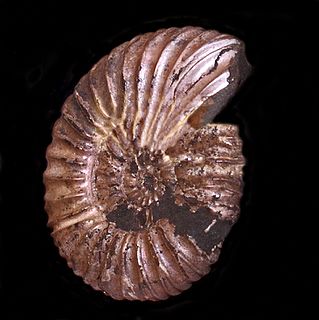
Pachysphinctes is an extinct genus of ammonites belonging to the Perisphinctidae family.

Rastellum is an extinct genus of molluscs, which lived from the Middle Jurassic to the Late Cretaceous. This species is also known as Arctostrea carinata.


